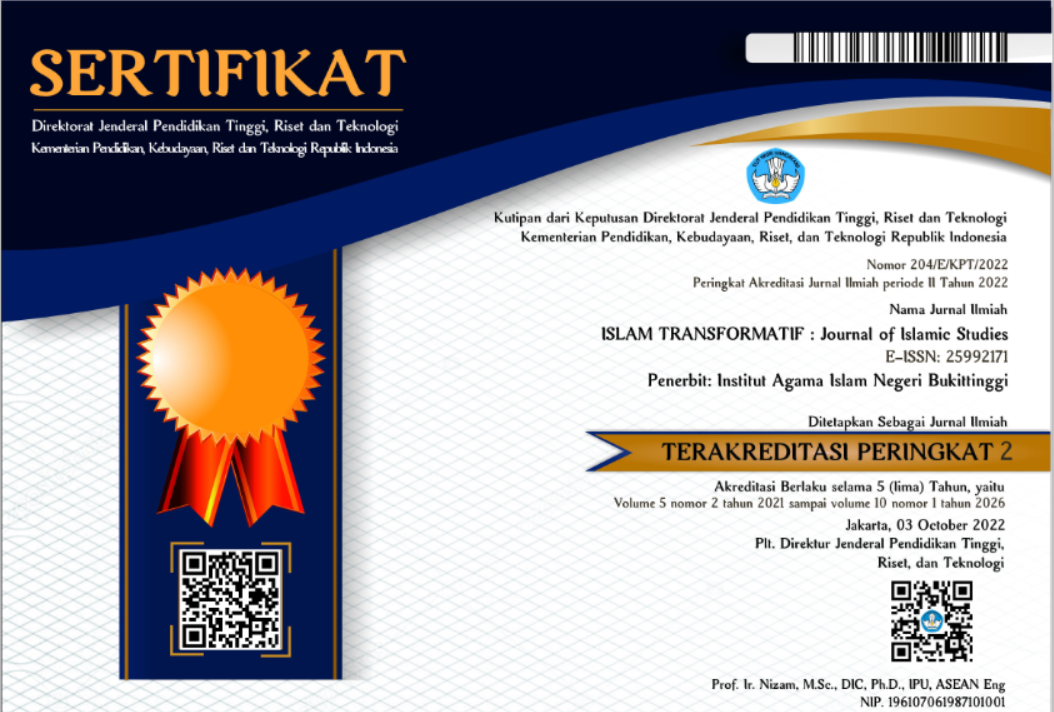MEMPERKUAT DAKWAH TRANSFORMATIF SEBAGAI SALAH SATU LANGKAH UNTUK MEMBANGUN IDENTITAS BANGSA YANG BERKEADABAN
DOI:
https://doi.org/10.30983/it.v3i2.2366Abstract
References
Asieweek, Penduduk Menurut Agama di Asia Tenggara, 1977.
Bell, Daniel, The End of Ideology, 1960.
BPS, Jumlah Penduduk menurut Agama, 2005
BPS, Jumlah penduduk miskin Pada Februari 2005-Februari 2006.
BPS, Pengangguran di Indonesia Februari 2008
Ciputra, Menjadi Pengusaha Tanpa Modal, Yogyakarta: Sekolah Pascasarjana UGM, 2008
Dirjen Bimas Islam dan Penyelenggaraan Haji, Dirjen Bimas Kristen, Dirjen Bimas Katholik, serta Dirjen Bimas Hindu dan Buddha, Data Jumlah Rumah Ibadah, Jakarta: Depag. Jakarta, 2007.
Human Development Indec 2003 dari NDP Foreign Direct Investment (FDI) 1999-2000 dalam World Investment Report (WIR) 2003.
Fakuyama dalam Modal Sosial pada Harrison dan Huntington (ed)., Kebangkitan Peran Budaya Bagaimana Nilai-nilai Membentuk Kemajuan Manusia, Jakarta: LP3ES, 2006.
Kuntowijoyo, Muslim tanpa Masjid, Bandung: Mizan, 2001.
Koentjaraningrat, Kebudayaan Mentalitas dan Pembangunan, Jakarta: PT. Gramedia, 2000.
McClelland, D. The Achieving Society, USA: Van Nostrand Company, 1961.
Putra, Doni. “Korupsi Di Indonesia Perspektif Hukum Islam.†ISLAM TRANSFORMATIF : Journal of Islamic Studies 1, no. 2 (March 6, 2018): 141–54. doi:10.30983/IT.V1I2.423.
Downloads
Published
How to Cite
Issue
Section
Citation Check
License
Authors who publish with this journal agree to the following terms:
- Authors retain copyright and grant the journal right of first publication with the work simultaneously licensed under a Creative Commons Attribution-ShareAlike 4.0 International License that allows others to share the work with an acknowledgment of the work's authorship and initial publication in this journal.
- Authors are able to enter into separate, additional contractual arrangements for the non-exclusive distribution of the journal's published version of the work (e.g., post it to an institutional repository or publish it in a book), with an acknowledgment of its initial publication in this journal.
- Authors are permitted and encouraged to post their work online (e.g., in institutional repositories or on their website) prior to and during the submission process, as it can lead to productive exchanges, as well as earlier and greater citation of published work (See The Effect of Open Access).




